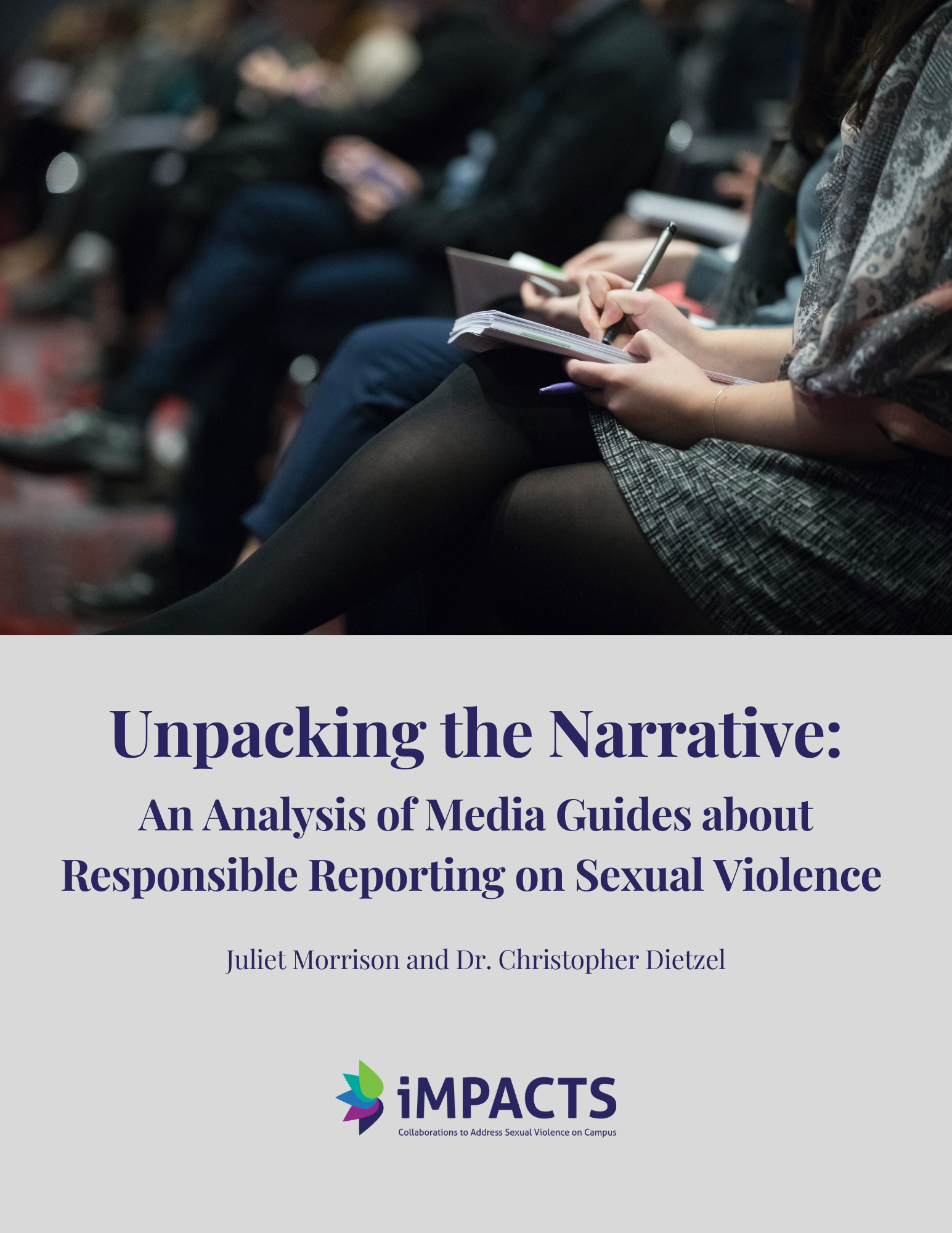
This project, titled “News and Social Media,” analyzes how sexual and gender-based violence is portrayed across media platforms and how survivors, students, and the general public engage with this content.
Specifically, this project has two overarching objectives:
- To empower and advocate for survivors by drawing attention to offensive and violent sexual content on news and digital platforms.
- To raise awareness and responsible media reporting of incidents that involve sexual and gender-based violence. “News and Social Media” has generated several research-based and multi-media projects from our university partners across Canada and our McGill student team.
McGill University – "Unpacking the Narrative"
Unpacking the Narrative: An Analysis of Media Guides about Responsible Reporting on Sexual Violence, authored by iMPACTS research assistant Juliet Morrison and Dr. Christopher Dietzel, presents findings from a project that analyzed media guides from several organizations that aim to guide journalists in covering stories on sexual violence. The purpose was to review the guides, uncover helpful recommendations, and provide suggestions for improvement. The report shows the importance of approaching people’s stories in a trauma-informed, survivor-centred manner and offers commentary on existing tools for journalists.
Click the link to learn more about Unpacking the Narrative and download the full report.

Simon Fraser University and Emily Carr University – “The P*rn Project” and “Incognito Mode”
Dr. Stuart Poyntz of Simon Fraser University and Dr. Ruth Beer of Emily Carr University of Art + Design engaged university students through qualitative interviews and theatre arts to explore the personal, social, and ideological consequences that young people have experienced as a result of being part of the first generation with unfettered and on-demand access to internet pornography. Interview data was used to create, in collaboration with Studio 58/Langara College, the theatre productions “The P*rn Project” and “Incognito Mode.”


The next phase of this project includes touring the play at post-secondary institutions and holding educational workshops that examine the impact of online access to pornography on young people’s understanding of sex, sexual violence, and sexuality. Check out below for some stills from the production of "Incognito Mode" at Neworld Theatre in Vancouver. Watch the animated short inspired by these projects below.
McGill University - Dating Apps, Safety, Health, and Consent
During his time on iMPACTS, Dr. Christopher Dietzel has been studying LGBTQ+ people's use of dating apps, particularly as it relates to sexual violence and consent. His dissertation, Sexual Violence Facilitated by Dating Apps: The Experiences of Men Who Have Sex with Men, highlighted and addressed the nature and extent of sexual violence against men who have sex with men (MSM) that is facilitated through their use of dating apps. Dr. Dietzel also has published several articles and book chapters on these topics, including Clickable Consent, which examines MSM's online and offline consent practices.
Dr. Dietzel has also examined connections between dating apps and users' safety, health, and consent through other research projects. In 2019, Dr. Dietzel worked with a team of Australian researchers to investigate the experiences of diverse dating app users. These findings are available in the Safety, risk, and wellbeing on dating apps: Final report. In 2020–2021, Dr. Dietzel worked with researchers from Concordia University and UQAM to examine dating app companies’ responses to the COVID-19 pandemic, and results were published in two scholarly publications #DatingWhileDistancing and The year of the “virtual date” as well as in this article from The Conversation, Relationships during a pandemic: How dating apps have adapted to COVID-19.
McGill University - Journalistic Practices and Reporting on Sexual Violence
Journalists are on the frontlines of shaping the public’s understanding of sexual violence because they contribute to society’s beliefs, knowledge, and attitudes relating to sexual violence. However, this power comes with the potential for harm. Irresponsible reporting can sensationalize sexual violence, perpetuate rape myths, contribute to misunderstandings about sexual violence, and retraumatize people who experienced sexual violence.
iMPACTS research assistants Farah Roxanne Stonebanks and Karen Andrews are conducting a literature review of journalistic practices to uncover what is known about how media organizations, reporters, and others remain sensitive to issues of sexual violence when reporting for news stories. The purpose of this project is to uncover information about the extent to which media actors are trained on how to cover sexual violence and examine if/how news outlets provide training on sexual violence, what topics the training encompasses, and who receives this training.
McGill University - Digital Literacy and Sexual Violence
Dr. Christian Ehret and Anita Hagh are conducting research focusing on digital literacy practices that youth use to navigate online environments where AI bots and algorithms can push users into content bubbles and echo chambers. Their research explores how youth engage with both online content and the algorithms that can create warped perceptions about sexualities and sexual violence. They are also exploring hopeful experiences in online media, including how youth can and do employ their digital literacies toward social change and against sexual violence. The next step of this project includes developing digital teaching guides for media literacy that will be co-produced with high school teachers in Quebec. The team also plans to publish their findings as a conceptual journal article on digital literacy.

